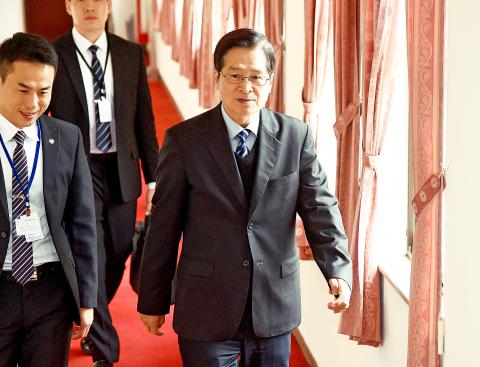The military has requested that Google limit the exposure of military installations in Google Maps’ new 3D function after netizens discovered that they could view missile defense batteries ringing Taipei, Minister of National Defense Yen De-fa (嚴德發) said yesterday.
The enhanced function, which went partially online three days ago, allows users to zoom in and view locations whose satellite imagery Google has digitized into 3D data.
Users can currently view much of Taipei and its surroundings through the function, including Taipei’s Shilin District (士林) and Sindian District (新店) in New Taipei City, where the National Security Bureau compound and missile defense batteries are located respectively.

Photo: Huang Yao-cheng, Taipei Times
The high-definition images clearly show individual MIM-104 Patriot missile launchers, as well as a detailed layout of the bureau’s headquarters, raising concerns that the Web-based tool could compromise national security.
Yen said that Google’s advanced commercial survey satellites and the open-source maps that they produce have been troubling military forces worldwide.
The military is changing its methods and procedures to meet such technological challenges, he said, adding that the Ministry of National Defense is confident that their effects on military operations could be neutralized.
“Important installations and bases have methods in place for force protection and preservation,” Yen said.
“A military camp’s peacetime posture does not indicate the positions forces will take when at war,” he said. “The public should not be concerned by this matter.”
The ministry is considering suggesting new legislation or regulations to shield military bases beyond the protections afforded by the Vital Area Regulations (要塞堡壘地帶法), the nation’s only law regulating the conduct of private entities around military facilities, Yen said.
The government has previously dealt with Google and other online map service providers over matters related to the display of sensitive installations on digital maps, a defense official said on condition of anonymity.
In each instance, the commercial entities cooperated with the government’s request to censor the sites, they said.
However, the military has placed a renewed emphasis on concealment and camouflage, as satellite technology, functionality and image resolution have advanced by leaps and bounds, they added.
“Mobile platforms, such as the Patriot Advanced Capability-3 and Tien Kung III missile systems, have over the past few years increasingly become the deployment method of choice, because fixed positions are more vulnerable to enemy fire,” the official said.
The US requires private Internet service providers to censor its military installations, as China does with Baidu Inc (百度), the official said, adding that the military takes force protection seriously and would take the necessary action to protect national security.
Additional reporting by Lo Tien-pin

US President Donald Trump yesterday announced sweeping "reciprocal tariffs" on US trading partners, including a 32 percent tax on goods from Taiwan that is set to take effect on Wednesday. At a Rose Garden event, Trump declared a 10 percent baseline tax on imports from all countries, with the White House saying it would take effect on Saturday. Countries with larger trade surpluses with the US would face higher duties beginning on Wednesday, including Taiwan (32 percent), China (34 percent), Japan (24 percent), South Korea (25 percent), Vietnam (46 percent) and Thailand (36 percent). Canada and Mexico, the two largest US trading

AIR SUPPORT: The Ministry of National Defense thanked the US for the delivery, adding that it was an indicator of the White House’s commitment to the Taiwan Relations Act Deputy Minister of National Defense Po Horng-huei (柏鴻輝) and Representative to the US Alexander Yui on Friday attended a delivery ceremony for the first of Taiwan’s long-awaited 66 F-16C/D Block 70 jets at a Lockheed Martin Corp factory in Greenville, South Carolina. “We are so proud to be the global home of the F-16 and to support Taiwan’s air defense capabilities,” US Representative William Timmons wrote on X, alongside a photograph of Taiwanese and US officials at the event. The F-16C/D Block 70 jets Taiwan ordered have the same capabilities as aircraft that had been upgraded to F-16Vs. The batch of Lockheed Martin

GRIDLOCK: The National Fire Agency’s Special Search and Rescue team is on standby to travel to the countries to help out with the rescue effort A powerful earthquake rocked Myanmar and neighboring Thailand yesterday, killing at least three people in Bangkok and burying dozens when a high-rise building under construction collapsed. Footage shared on social media from Myanmar’s second-largest city showed widespread destruction, raising fears that many were trapped under the rubble or killed. The magnitude 7.7 earthquake, with an epicenter near Mandalay in Myanmar, struck at midday and was followed by a strong magnitude 6.4 aftershock. The extent of death, injury and destruction — especially in Myanmar, which is embroiled in a civil war and where information is tightly controlled at the best of times —

China's military today said it began joint army, navy and rocket force exercises around Taiwan to "serve as a stern warning and powerful deterrent against Taiwanese independence," calling President William Lai (賴清德) a "parasite." The exercises come after Lai called Beijing a "foreign hostile force" last month. More than 10 Chinese military ships approached close to Taiwan's 24 nautical mile (44.4km) contiguous zone this morning and Taiwan sent its own warships to respond, two senior Taiwanese officials said. Taiwan has not yet detected any live fire by the Chinese military so far, one of the officials said. The drills took place after US Secretary